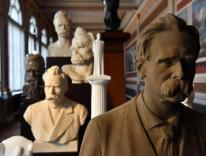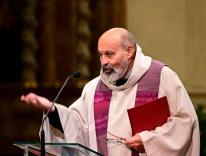The death of Pope John Paul II has unleashed an outpouring of grief and gratitude for a man who may well have been the most widely recognizable human being of our time. This pope’s virtually unparalleled charisma and productivity and the length of his reign will likely rank his pontificate among the most influential in church history. Studies on the contributions of Pope John Paul II and his impact on the church will engage theologians and church historians for decades to come.
In the midst of this widespread mourning it is inevitable that the world will also be looking to the future. By the time this article appears we may already have a new pope. Over the weeks and months ahead there will be much discussion regarding items that ought to appear on a new papal agenda. Many will hope for a spiritual clone of John Paul II, a pope who will continue to encourage a robust and evangelical Catholicism capable of confronting the insidious relativism of our age. Others will wish for a pope with the courage to change Catholic teachings they find troubling. We will surely hear more, as we probably should, about issues that still rankle the church politic (at least in North America): women’s ordination, mandatory priestly celibacy, and homosexuality.
I harbor my own “wish list” for our new pope. Yet perhaps our hopes and prayers ought to leave more room for the work of the Spirit and focus less on issues and more on papal vision. For my part, I shall be content to pray that our new pope might allow two insights affirmed throughout the documents of Vatican II to inform his vision for the church: First, the Word of God is addressed to the whole church. And second, living in history as a faithful follower of Jesus requires an eschatological humility.
In Dei verbum, Vatican II taught that God’s word is addressed to the whole people of God. This word is received by the whole church through a supernatural instinct for the faith given by the Spirit to each believer at baptism. The council called this the sensus fidei (see Lumen gentium, 12). It is the Spirit “who moves the heart and converts it to God, and opens the eyes of the mind and makes it easy for all to accept and believe the truth” (Dei verbum, 5). The council taught that a deepened understanding of this received word would come “through the contemplation and study of believers,” through the spiritual experiences of those same believers, and through the preaching and teaching of the bishops (Dei verbum, 8).
This basic insight has startling consequences for the church, and any pope who truly grasps its implications will have to think about our church in new ways. The council’s teaching suggests that the whole church, as a spirited communion, shares in the custodianship of God’s saving offer. It means that while the bishops, in communion with the bishop of Rome, are to give an authoritative testimony to the substance of that received word in their preaching and teaching, they are nonetheless servants of that word (Dei verbum, 10).
It is my hope that the new pope will meditate on the opening lines of Dei verbum, “hearing the word of God reverently, and proclaiming it confidently, this sacred synod...” and in those words grasp that it is always the responsibility of the church and its teachers to be first learners, hearers of the word. May the next pope discover that among the many places where God’s word can be discerned—in Scripture, the liturgy, the fathers and mothers of the church, its learned “doctors” past and present, the sublime witness of saints old and new—it can be heard also in the holy conversation of the baptized followers of Jesus. He must not forget, as Cardinal Leon-Joseph Suenens once remarked, that the most important day of his life was not that of his papal election but that of his baptism, and therein recall the dignity and wisdom of the baptized.
I hope our next pope will encourage the honest and prayerful conversation of the people of God through the reform of existing participative structures and the creation of new and more effective ones. May he recall both the surprising counsel of St. Benedict of Nursia, who advised the abbot to seek out the voice of the least in the community, and the wisdom of St. Paulinus, fifth-century bishop of Nola: “Let us listen to what all the faithful say, because in every one of them the Spirit of God breathes.” May he resist the temptation to control or direct that holy conversation toward predetermined conclusions. In what passes for civic discourse in our day we tend to demonize those who dare to disagree with us; maybe the Spirit will give us a pope with the courage to listen to the voice of disagreement and call us to renounce the language of demonization as a condition of our participating in the holy conversation of the church.
This is no liberal fantasy for a democratic church, but a quite traditional longing for a genuine community of discernment that dares to introduce its decisions as did the church of Jerusalem: “It is the decision of the Holy Spirit and of us...” (Acts 15). It is a longing for a church that raises up leaders who recognize that leading and listening are not mutually exclusive.
Second, I hope for a pope who has a healthy dose of eschatological humility. Eschatological humility treasures divine truth as it is mediated through the received faith of the church but also recognizes that we do not so much possess divine truth as it possesses us. The revelation of God’s love comes to us first, not in doctrinal formulae, but as a person, Jesus Christ, who is for us “both the mediator and the sum total of revelation” (Dei verbum, 2). As the council taught, the church is “always advancing toward the plenitude of divine truth” (Dei verbum, 8). A pope with eschatological humility would know that in the final consummation of all things in God, our confident dogmatic assertions will be seen, not as erroneous, but as inevitably impoverished before that ineffable mystery that is God. Such a pope would not hesitate to give testimony before the world to the truth so treasured by followers of Jesus, but he would readily acknowledge that although the church is “guardian of the deposit of God’s word, and draws religious and moral principles from it...it does not always have a ready answer to every question” (Gaudium et spes, 23).
Eschatological humility comes with understanding as well what it means to belong to, and to lead, a church that is pilgrim—a church that is confident it has set upon the right path and wishes to share that way with others but that knows it has not yet arrived (Lumen gentium, 48). A pope with eschatological humility would know that this pilgrim church need never fear reform and renewal, for it is only by reform and renewal that the church will hobble forward on its journey (Unitatis redintegratio, 6). Let us pray for a pope who believes that God’s Spirit abides in the church as in a temple and speaks in and through that church’s corporate discernment. Let us pray for a pope who speaks with a conviction chastened by the modesty befitting a pilgrim. Such a pope would truly merit the ancient title servus servorum Dei, “servant of the servants of God.”


